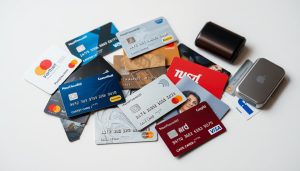Ever wondered why getting your first credit card is tough? Many find the path to approval confusing and scary. This guide aims to make it clear and easy to get your first credit card.
We’ll tackle the common problems beginners face. You’ll learn how to increase your chances of approval. It’s all about making smart financial choices.
In this beginner’s guide, you’ll find key resources and expert tips. They’re designed to help you understand credit better. Knowing the basics is crucial for making good financial decisions.
Why Getting a First Credit Card Matters
Getting a first credit card is key for those starting out. It helps build a strong credit history. This history is vital for getting good loan terms and rates later on.
Without a credit history, getting big loans for things like homes or cars can be tough. This is why a first credit card is so important.
Credit cards offer more than just building credit. They let you access money when you need it. This can be a lifesaver during unexpected expenses.
Many credit cards also have rewards programs. These can give you cash back or points for travel or other perks. These benefits encourage smart spending and add value to your life.
Understanding how credit cards can improve your finances is crucial. Using them wisely can lead to long-term financial success. It’s a smart step for anyone starting their credit journey.
Understanding Credit Scores in Canada
Knowing about credit scores is key for getting financial products in Canada. This is especially true for those applying for their first credit card. In Canada, credit scores range from 300 to 900. A higher score means you’re more creditworthy.
Many things can change your credit score. A good payment history is very important. It shows you pay your debts on time. Keeping your credit use under 30% also helps.
Having a long credit history is good too. It shows you’re reliable over time. Understanding these points can help you manage your credit better.
A good credit score is very important. It makes it easier to get approved for credit cards. It also leads to better interest rates and loan terms. By knowing how credit scores work, you can improve your financial health.
Types of Credit Cards Available
Choosing the right credit card is key for anyone starting their financial journey. There are many types of credit cards for beginners, each with its own benefits. Secured credit cards are a great choice, requiring a cash deposit as the credit limit. This makes it easier for new users to get approved.
Student credit cards are another good option for beginners. They often have lower requirements and offer rewards like cash back or points for good grades. This makes them perfect for young adults.
There are also traditional credit cards designed for beginners. These cards have lower interest rates and fees, which is great for new users. By knowing the different types of credit cards, beginners can find one that fits their financial goals.
Preparing Your Application
Before you start your first credit card application, it’s crucial to prepare well. Getting ready for your application makes the process smoother and boosts your chances of getting approved. First, collect all the documents you need for your credit card application. Make sure all the information is correct and current.
Important documents include your ID, like a driver’s license or passport, and proof of income. This could be recent pay stubs or tax returns. You might also need to show where you live, with a utility bill or lease agreement. Having these documents ready helps you fill out your application quickly, avoiding delays from missing info.
Spending time to prepare well is key to a successful application. Studies show that well-organized applications are more likely to get approved. This highlights the value of thorough preparation.
How to Improve Chances of Approval
Getting a credit card approved is more than just applying. There are steps you can take to boost your chances. First, showing a steady income is key. Lenders want to see you can handle credit well, which means having a stable job.
Keeping your debts low is also important. A lower debt-to-income ratio means you’re more likely to get approved. Paying off debts on time helps lenders see you as a responsible borrower.
Knowing about pre-approval checks can also help. These checks let you see if you qualify without hurting your credit score. Getting advice from credit counseling agencies can also help improve your financial health. This makes getting a credit card easier.
What Lenders Look For in Applicants
Lenders check many things when you apply for a credit card. They look at your credit score first. A higher score means you’re more likely to get approved.
They also check how much money you make. This shows if you can pay back what you borrow. Having a steady job is important too. It shows you’re financially stable.
How much debt you have matters too. Lenders want to see if you can handle more debt. Being honest about your finances helps lenders make better choices.
The Application Process Explained
Applying for a credit card involves several steps. You can apply online or in-person, based on your preference and the issuer’s options. Online applications are often easy to use, thanks to banks’ user-friendly websites.
When applying online, you’ll need to fill out a form. This form asks for your personal and financial details, as well as identification. It’s important to be accurate and double-check your information.
Knowing how to apply for a credit card is key. Common mistakes can hurt your chances of approval. For example, giving wrong information or not checking your credit score can cause delays.
Applicants should take their time and review their application carefully. The time it takes to get a decision varies. It can be a few minutes or a few days, depending on the lender.
Understanding Terms and Conditions
When you pick a credit card, it’s key to look at the terms and conditions. These documents have important info on interest rates, fees, rewards, and how to pay back. Knowing what’s in these contracts helps you make smart choices and understand what you’re agreeing to.
Terms often include the annual percentage rate (APR) for different types of transactions. If you’re late with payments, you might face a higher APR. It’s crucial to understand these points. Also, the grace period lets you pay off balances without interest. But, many people miss the annual fees and extra charges for things like balance transfers and foreign transactions.
Talking to customer service from your credit card company can help too. They can explain tricky terms and answer your questions. Knowing your contract well helps avoid money problems and makes the most of rewards. This is the first step to using credit wisely.
For more info on terms and conditions, check out the Credit Card Accountability Responsibility and Disclosure. It offers key tips to help you understand your credit deals better.
Dos and Don’ts of Applying
Applying for a credit card can be tricky. Knowing the right steps can help a lot. First, check your credit score before you apply. This helps you see where you stand and fix any problems early on.
Don’t apply for many cards at once. This can hurt your credit score and lead to rejection. Lenders might think you’re having money troubles.
Make sure you have all the documents you need and fill out the application correctly. Many people forget this, causing delays or even denial. Being organized and accurate can help you get approved.
In short, following the dos and don’ts of card applications can greatly improve your chances of getting approved. Take the time to learn these strategies to avoid common mistakes.
What to Expect After Approval
After getting credit card approval, you enter a new phase. Getting your card is a big step in your financial life. It usually arrives in the mail a few days later, with clear instructions.
It’s important to read these instructions carefully. They tell you how to activate your card. This is the first step to using it.
Knowing what happens after approval is key. Your card has a credit limit, based on your credit score. This limit helps you manage your spending. Spending more than this can hurt your credit score.
For a good start, make your first purchase small. This helps you avoid debt and builds a good credit history.
Experts say it’s crucial to pay on time and keep balances low. Check your monthly statements to watch your spending. Using your card wisely is the first step to a strong credit score.
Building Credit Responsibly After Approval
Getting approved for a first credit card is just the start. It’s important to use it wisely to build a strong financial base. Paying on time is key. It avoids late fees and helps your credit score.
Keeping your balance low is also crucial. Try to use less than 30% of your credit limit. This helps your credit score a lot. Always check your statements to avoid surprises.
Using credit wisely means more than just paying on time. It’s about smart spending and planning. By doing this, you set yourself up for better financial chances later. You might get lower interest rates and higher credit limits.




